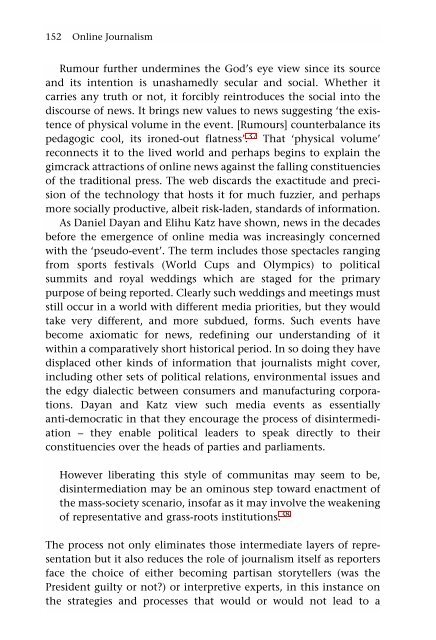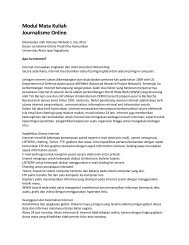Online Journalism - Ayo Menulis FISIP UAJY
Online Journalism - Ayo Menulis FISIP UAJY
Online Journalism - Ayo Menulis FISIP UAJY
You also want an ePaper? Increase the reach of your titles
YUMPU automatically turns print PDFs into web optimized ePapers that Google loves.
152 <strong>Online</strong> <strong>Journalism</strong><br />
Rumour further undermines the God’s eye view since its source<br />
and its intention is unashamedly secular and social. Whether it<br />
carries any truth or not, it forcibly reintroduces the social into the<br />
discourse of news. It brings new values to news suggesting ‘the existence<br />
of physical volume in the event. [Rumours] counterbalance its<br />
pedagogic cool, its ironed-out flatness’. 37 That ‘physical volume’<br />
reconnects it to the lived world and perhaps begins to explain the<br />
gimcrack attractions of online news against the falling constituencies<br />
of the traditional press. The web discards the exactitude and precision<br />
of the technology that hosts it for much fuzzier, and perhaps<br />
more socially productive, albeit risk-laden, standards of information.<br />
As Daniel Dayan and Elihu Katz have shown, news in the decades<br />
before the emergence of online media was increasingly concerned<br />
with the ‘pseudo-event’. The term includes those spectacles ranging<br />
from sports festivals (World Cups and Olympics) to political<br />
summits and royal weddings which are staged for the primary<br />
purpose of being reported. Clearly such weddings and meetings must<br />
still occur in a world with different media priorities, but they would<br />
take very different, and more subdued, forms. Such events have<br />
become axiomatic for news, redefining our understanding of it<br />
within a comparatively short historical period. In so doing they have<br />
displaced other kinds of information that journalists might cover,<br />
including other sets of political relations, environmental issues and<br />
the edgy dialectic between consumers and manufacturing corporations.<br />
Dayan and Katz view such media events as essentially<br />
anti-democratic in that they encourage the process of disintermediation<br />
– they enable political leaders to speak directly to their<br />
constituencies over the heads of parties and parliaments.<br />
However liberating this style of communitas may seem to be,<br />
disintermediation may be an ominous step toward enactment of<br />
the mass-society scenario, insofar as it may involve the weakening<br />
of representative and grass-roots institutions. 38<br />
The process not only eliminates those intermediate layers of representation<br />
but it also reduces the role of journalism itself as reporters<br />
face the choice of either becoming partisan storytellers (was the<br />
President guilty or not?) or interpretive experts, in this instance on<br />
the strategies and processes that would or would not lead to a
















